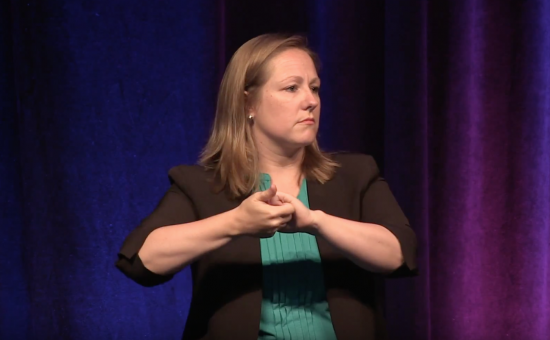Sign Language Interpreters: Purposeful Change for Power Holders
Looking at leadership styles and models informs choices as we act as interpreters or in leadership roles. Dave Coyne explores the nature of leadership and how transformational leadership can positively impact interpreted interactions.
Since I gained professional status as a sign language interpreter, I have witnessed oppression of various types, more than I would like, such as disenfranchisement of Deaf community members, abuse of power by interpreters, and discrimination against Deaf individuals. These are alarming and call for changes in how interpreters work.
Incorporating Leadership into our Work
Interpreters are in the trenches in many locations in which Deaf members struggle for equality (e.g., homes, schools, hospitals, and other societal institutions). This situation calls for a specific kind of leadership that personally influences individuals in both top-down and bottom-up approaches, surfacing in interpreters’ roles in day-to-day interactions.
These locations represent where change is most needed, and where sign language interpreters can best work toward reaching the liberative goals put forth by the Deaf community. Merely acting as spectators or watching Deaf members wage the battle alone, is not enough for many interpreters. Passive involvement is not enough because the way in which interpreters perform their jobs in the midst of community members’ daily struggles, and the approaches used to carry out practices can contribute to or hinder purposeful contributions, contributions that can represent momentum by fostering positive changes. These purposeful contributions (e.g., allowing others to lead their actions) can humble interpreters yet foster participants’ advancement in most situations. More importantly, incorporating leadership into interpreting practices can prompt styles that prevent inconsistent approaches.
Collective Causations
Leadership has been at the periphery of many conversations, but for sign language interpreter Amy Seiberlich, this topic should be at the forefront. Seiberlich (2012) in her StreetLeverage article, “Leadership in Sign Language Interpreting: Where are We?” highlighted the idea that historical causation created directions in the interpreting field which have led to many of our current problems.
Today’s daily interactions are often devoid of the collective purposes needed to establish meaningful connections with Deaf individuals. For many years, attempts have been made to formulate national collective causations at RID’s biennial conference, hosted by the Deaf Caucus. The Caucus was successful in gathering practices considered important by Deaf members, families of Deaf members, interpreters, and educators. To be used effectively, this information, gathered, analyzed, and shared, requires the support and integration by all stakeholders involved, specifically sign language interpreters. If integration of preferred practices are not carefully monitored, then community-specific information can be utilized only for convenient position-taking.
Transformational Leadership Theory
In viewing interpreters as leaders, stakeholders hold individuals, institutions, and organizations accountable for their actions: there is simply too much at stake not to consider a transformational approach.
Incorporating transformational leadership traits into interpreters’ work is only one way to address the many struggles that sign language interpreters, systems and institutions, and interlocutors deal with. This method encourages progression toward various kinds of emancipation and prompts active support of Deaf community members. This approach can prove useful for discovering how to sort through and piece together the fragmentation between professionals and communities.
Interpreters’ practices and their approaches to interpreting are distinctive. Thus, asking interpreters to identify with social conditions and interactions deemed significant by Deaf members may begin to counterbalance the negative effects coming from interpreters in the field. Specific suggestions provided by Denis Cokely (2011) in “Sign Language Interpreters – Complicit in a Devil’s Bargain” touched on the social influences wielded by interpreters who are either tightly bound or less bound to the Deaf Community. Each of his suggestions carries differing implications and results.
Relational-based Change
Individuals who mistakenly believe they can separate language and culture and do not share Deaf community members’ goals and views can be no more than bilingual-monocultural rather than bilingual-bicultural interpreters. On the other hand, those who form strong bonds with the Deaf community can potentially achieve bicultural status (sharing goals, views, and norms), utilizing full bilingual skill sets. Interpreters who work as biculturals are able to co-create relational-based encounters to effect change.
Monocultural individuals who see their work strictly as commerce-based agreements (transactional) for interpreting services, too often fail to consider the additional collaborative components of their work (e.g., discussing strategies for participants’ success, listening to concerns and experiences, and participating in ways that further the greater good) as part of their professional duties. These critical reviews of interpreter practices are needed to detail purposeful behaviors that are crucial to supporting participants’ needs, values, and expectations.
Leadership Styles
Burns (1978) defined leadership thus:
“the reciprocal process of mobilizing, by persons with certain motives and values, various economic, political, and other resources, in a context of competition and conflict, in order to realize goals independently or mutually held by the leaders and followers” (p. 425).
This quote placed shared goals as a pivotal component in different leadership styles. Due to the very nature of interpreting, interpreters are special kinds of power-holders. Their collective motives and values can be used to satisfy, or not satisfy others’ individual and shared goals. The process of reaching these goals may cause internal struggles in interpreters who do not fully understand the motives and values of the individuals they work with. For others, conversations about leadership theories give rise to the vocabulary needed to address the concerns, needs, and expectations of those working with interpreters. According to Burns (1978), leadership is specifically targeted to everyone involved in interactions (but especially the power-holders). If all are fully engaging in and discovering the center of leadership itself, they will find that leaders and participants have intertwined practices, perceptions, values, and motivations.
Today’s interpreter leaders are not only in managerial and other upper level positions, but are also interpreters themselves, involved in daily interactions where common goals are supported. More than ever, we must continue to discover more about the individuals who hold power, those who wield sole power, and the powerless. Discussions surrounding power have surfaced in national conferences and daily conversations: Deaf members and interpreters convene to raise awareness of the effects of power. In doing so, they draw back from full power, sharing it instead: thereby contribute to closing the disconnect that exists between some interpreters and Deaf members. Any conflicts or coalitions that come up have the potential to shape popular opinion and forever change interpreters’ future business.
Transactional Leadership
Transactional leadership emphasizes an exchange between those involved to satisfy solely independent objectives. The interpreting field, which has boomed into a million dollar industry in a short period of time, has too many individuals who facilitate communication with an “in and out” or “I do this and you give me that” approach. Transactional leaders’ foci lie in satisfying agreed-upon objectives, regardless of what interlocutors need out from the encounter. They do not seek mutual support or understanding (in other words, ‘I am here to interpret this information to the best of my abilities for compensation, but not to discuss anyone’s overall well-being because that is outside my professional boundaries’).
This type of ‘service’ carries consequences (e.g., Deaf and hearing individuals are groomed to merely accept interpreters’ practices ‘as is’ to ensure future opportunities take place). Simply put, when approached as mere contractual obligations, these practices (known or unknown) obligate participants to comply with requests through a transactional leadership exchange process. This “I interpret, and then I get compensated” approach does not further meaningful dialogue or deepen relationships. The reality of this mindset between interpreters and Deaf individuals has been shown to foster the negative effects on Deaf individuals, described as ‘ripples’ of disempowerment by Trudy Suggs (2012) in “Deaf Disempowerment and Today’s Interpreter.” Transactional-based encounters can potentially cause negative effects which indeed transcend interpreting spaces. These ripples that remain after interpreters leave, can potentially bring about more pernicious forms of oppression (even if unintentional) than overt discrimination or retaliation.
Transformational Leadership
Transformational leadership is predominantly displayed inside rather than outside educational spheres. However, some studies (Burns, 1978) have confirmed that even outside educational spheres, transformational leadership can positively affect one’s ability to create environments incorporating individual participants’ and groups’ desired needs, values, and goals while engaging them. Transformational leadership has been applied most often during crises: “…in those conditions, a leader can seize the opportunity to identify the deficiencies of the status quo, and promote a future state that will appeal to followers” (In Antonakis & House, 2002, p. 13). Interpreters, as potential transformational leaders working closely alongside with Deaf members, put forth issues that can directly enhance the quality of lives. In incorporating these transformational leadership skill sets, interpreters alter spaces to achieve participants’ ends.
Leadership inspires the individuals involved to collaborate in attaining a higher quality of life. Transformational leadership rests on the idea that leaders are guided at all times by participants. The emphasis placed is on participants’ beliefs, needs, and values. Because interpreters manage interpreting spaces, they are central to communication exchanges. It is vital for interpreters to approach situations with sensitivity because Deaf members are already in the minority. Practices of transformational interpreters include checking in with the participants more often, inquiring about the next steps to take, and ensuring (the best they can) no further disempowerment occurs.
Bass and Riggio (2006) noted that transformational leaders typically display four characteristics: individual considerations, intellectual stimulation, inspirational motivation, and idealized influence. These traits once learned, promote participants’ visions and goals, bolster intellectual stimulation, hone professional practices and values, promote high performance expectations, and lead to their increased decision-making. In sum, integrating transformational leadership into the field, interpreters take leadership to heart, shifting the emphasis in environments (established by a history of both social and political factors) on Deaf members, away from interpreters.
Next Steps Toward Change
Understanding how interpreters can work effectively with the Deaf community begins by investigating how they currently analyze situations and how they believe they behave as professionals. Interpreters must initiate potentially uncomfortable conversations with stakeholders in order to learn as much as possible about the Deaf community. This information can lend insights into needed changes in both the field, and interpreters’ approaches, and create a common purpose for professional work. Exchanges that merely result in transactional-based encounters can be modified to be more transformational in nature. This crossover between approaches can be achieved through education, dialogue and discussions, all in which involve shared motives and values that are brought to the table to garner purposeful change.
By learning and implementing transformational leadership traits into our work, we as individuals in the field, can devise purposeful actions to address many current concerns about some interpreters. Actions from transformational leaders that spur trust, collaboration, and accountability are needed now more than ever to confront current issues. The individuals who work with interpreters should be at the forefront of any decisions made: it is to be hoped that what results from these purposeful collaborations will contribute to change for the common good.
My ambition has always been to consider a holistic approach to mend real gaps, often unintentional ones, between the interpreting and Deaf communities. I propose, wholeheartedly and assuredly, that interpreters’ practices and approaches to their work be investigated using grassroots and bottom-up methods that progresses beyond the current status quo.
Join me?
References
- Antonakis, J., & House, R. J. (2002). An analysis of the full-range leadership theory: The way forward. In B., Avolio, & F., Yammarino (Eds.), Transformational and charismatic leadership: (pp. 3–33). Amsterdam: JAI Press.
- Burns, J. M. (1978). Leadership.New York: Harper & Row
- Bass. B.M. & Riggio. R.E. (2006). Transformational Leadership, Mahwah, NJ: Lawrence Erlbaum. NJ.













